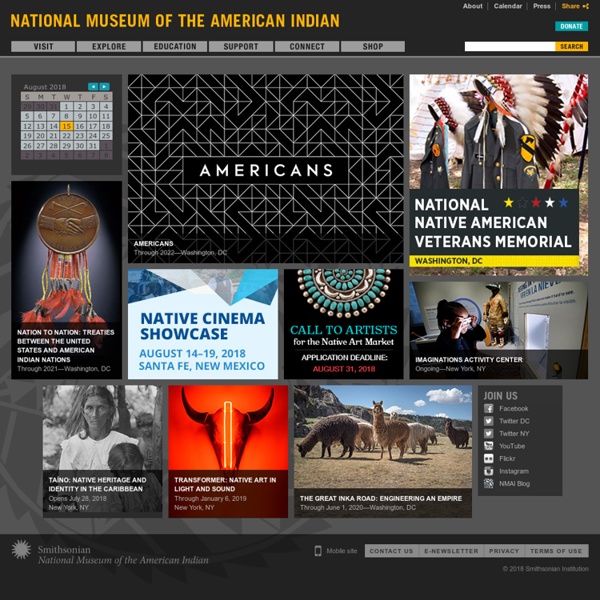



Native American Indian Tribes: Federally Recognized Tribes This page not only lists all the federally recognized tribes of Native Americans, but also has links from those tribes for their official websites, stories and legends, books, photographs and artwork. This is a work very much in progress and will take a long while to complete [unless you all help with this resource]. Right now I have links to over 150 website locations from about 26 different tribes on this page. I will try to add comprehensive links to an additional one or two tribes each month (moon).
Native American Home Pages - Nations Tribal Connections in the Pacific Northwest - connecting American Indian/Alaska Native Communities to Health Resources on the Internet. Added 10/7/99ALGONQUIAN If you are looking for information on the "Algonquian Indians", you can stop right now. "Algonquian" is not the name of a Native tribe or nation; it is a language family, like "romance" or "indo-european". There are no "Algonquian Indians"; but there are Algonquin Indians in Canada. New York Guggenheim Go New York On View Now Americas Historical Maps Skip to Content Libraries Home | Mobile | My Account | Renew Items | Sitemap | Help | University of Texas Libraries Home > Finding Information > PCL Map Collection > Historical > Historical Maps of the Americas MapsMaps FAQ
Coyote and the Columbia: From Native American Myths at Americanfolklore From the Sahaptin/Salishan Tribes retold by S. Japan Society, New York - Gallery March 11–June 12, 2016 The catastrophic earthquake and tsunami that struck northeast Japan on March 11, 2011 and triggered an on-going nuclear crisis has been met with an overwhelming reaction in the arts, marking a profound shift in the contemporary Japanese cultural landscape. Opening five years to the day since 3/11, Japan Society’s presentation of In the Wake reveals a stunning range of photographic responses to the disaster and the artistic paths that lie ahead as Japan continues to rebuild. Experience the power of art to transcend unspeakable tragedy with over 90 photographic works by 17 of Japan’s leading visionaries, including Nobuyoshi Araki, Naoya Hatakeyama, Keizō Kitajima, Lieko Shiga, and Tomoko Yoneda. This exhibition was organized by the Museum of Fine Arts, Boston.
5 Great Infographics for Language Teachers and Learners Infographics are great learning materials. The colourful graphics, clear text and their size make them ideal for classroom integration. I have been posting some of the ones I deem educationl to help teachers leverage this resource to create engaging, relevant and personalized learning experiences in their classes. In this regard, I am introducing you today to a series made up of four parts all containing the best infograpgics about English language teaching and learning. Due to their size we could not embed all the infographics in one post instead we distributed them on four posts with each one of them containing links to other posts to make it easy for you to navigate the four posts without having to move away.
Native American Proverbs and Wisdom When we show our respect for other living things, they respond with respect for us. - Arapaho If we wonder often, the gift of knowledge will come. - Arapaho Most of us do not look as handsome to others as we do to ourselves. - Assiniboine Film Links Until quite recently it was difficult to find pedagogically sound film material to help students improve their language through watching film, and teachers had to spend many hours creating their own materials. However, with the advent of the Internet there are now a wealth of online resources for both language teachers and their students. With so many resources it’s sometimes difficult for teachers to see the wood for the trees. Here I’m going to recommend the sites and resources that from my own experience I have found most useful and engaging.
Interactive exhibits on the history, arts, and culture of the Native Americans. by nda_librarian Apr 28